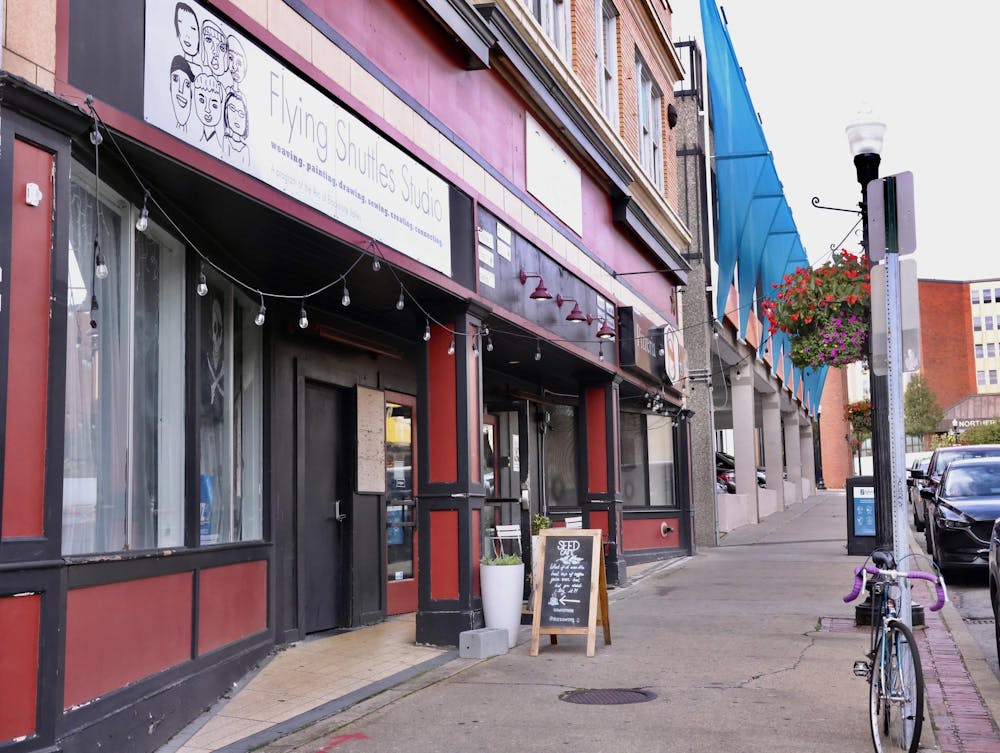Many development projects are popping up in Pawtucket, RI.
A new state-of-the-art soccer stadium is six months out from opening, and planning has begun for the revitalization of the previously iconic but now mostly unused Apex building. Many housing projects are also set for construction.
Amidst so many changes to the city, Leslie Moore, a developer of both Central Falls and Pawtucket, has attempted to build affordable and community-centered projects that focus on supporting small businesses and unlikely entrepreneurs.
The Pawtucket Redevelopment Agency launched its “Downtown Gateway Project” in July, in the hopes of “activating the riverfront and creating public recreation spaces.” The project “provides an opportunity to reshape Pawtucket for generations,” according to the press release.
But Moore, a resident of Central Falls, told The Herald that she is often disappointed by downtown development and its frequent result of gentrification. She described gentrification as favoring “folks with more money” and creating benefits that people “who are waiting (for change) do not get to enjoy.”
As a developer, Moore decided to try something different: “not to do gentrification,” she said, noting the lack of vocabulary that exists to describe other types of development.
Since 2017, Moore has bought over eight properties in downtown Pawtucket and nearby Central Falls. Uses for the properties include a mini-mall, a business center, apartment units, cafes, a performing arts space, an African American Innovation Center and an ice cream shop. Most of the properties are mixed-use, which Moore has done to offset costs.
According to Moore, the goal of her development is “to give marginalized communit(ies) an opportunity to be in the center of community life.”
Much of Moore’s work has attempted to turn Pawtucket’s main street, which has experienced the shuttering of many businesses, into what is known as “The Black Block Cultural District.” Moore envisions the block as a hub for entertainment, food and shopping as well as a site of empowerment for Black communities.
The cultural district’s purpose centers on “honoring the many lived experiences of slavery and oppressive backgrounds commonly shared” by people in the district, according to its website.
“Still On Main” — a mini-mall on Pawtucket’s main street that features stores including a barbershop, a coffee shop, a gaming lounge and a beauty salon — rents all of its units to community members at a discounted price.

Rather than advertising the units, the mall has been expanding through word of mouth, Moore said. The same is true of “The Green On Main,” an indoor park and marketplace catered for entrepreneurs who do not have time to run their businesses full-time.

Tahjeeana Hall, an 18-year-old who moved to Pawtucket after graduating high school, shared that Moore provided her with a place to stay and work after her arrival.
Hall works at both a second-hand boutique as well as a hair salon within the mall. She said she sometimes also helps with other tasks in the mall, like decorating or fixing tables.
Speaking to the community that exists within the mall, Hall described people as “very warm and welcoming.”
Aroneae Washington, who owns Still On Main Pizzeria, said that the mini-mall provides “a jump start” for people. Before coming to Still On Main, Washington had worked in several sandwich shops but never had his own, he added.
Like Hall, Washington described the community of businesses within the mall as supportive.
Hall said that the community at The Guest House — a name Moore used to describe the property that hosts “people who have had to start over” — is also very welcoming. “There’s a lot of good people around here,” Hall added. The House provides housing at a discounted rent to its tenants.
Moore said that she felt the house’s Central Falls location was fitting, given the city’s historic place as a starting place for many immigrants.
In addition to The Guest House, Moore has developed eight apartments that are expected to open within the next four months, as well as 28 other apartments that are set to open within the year.
Moore shared that growing costs have increased the estimated rents for these apartments. To bring down these prices, she said she has worked to find “creative solutions,” including building smaller units and potentially having short-term rentals or hostels.
Like Providence, Pawtucket has also suffered from increasing housing prices as a result of the limited housing stock in Rhode Island. “We need housing. We need options that work for the regular business owner, just a typical person who’s got a job,” Moore said.
Moore shared that she has set an internal timeline of January 2026 as a completion date for all development projects. She stressed that the deadline was necessary to demonstrate to the community that she is intent on making timely change.
“If our plan is so big that it takes too long, we’re going to change our plan because it’s that important that people have hope, see progress and know that change is possible,” Moore said.

Mikayla Kennedy is a Metro editor covering housing and transportation. They are a junior from New York City studying Political Science and Public Policy Economics.





